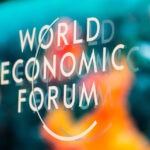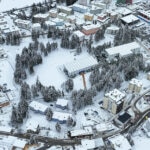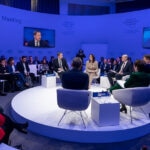Davos 2025: Collaboration for the Intelligent Age
Davos will be held in Switzerland from January 20th - 24th with the theme ‘Collaboration for the Intelligent Age’. The event organized by the World Economic Forum will bring together governments, international organizations and around 1,000 companies, as well as civil society leaders, young agents of change, social entrepreneurs and the media. Davos 2025 is taking place in a global context marked by geopolitical and economic uncertainties, trade tension, cultural polarization and the climate crisis. However, it is also an opportunity to reflect on the positive impact of technologies like artificial intelligence, quantum computing and biotechnology, which promise to boost productivity and improve the quality of life worldwide.

The theme this year is inspired by World Economic Forum founder, Klaus Schwab. He argues that the converging technologies are reshaping the world at an unprecedented pace, pushing us to a tipping point. Schwab, who will step down from his position as Executive Chairman in January 2025 and be replaced by the second-in-command at the organization, the Norwegian Børge Brende, explained that: “it is an era that goes far beyond technology alone. This is a societal revolution, one that has the power to elevate humanity – or indeed to fracture it.
For over 50 years, this annual forum has served as a global platform where company leaders, governments, international organizations, civil society and academia come together to discuss critical issues. And over the past five decades, Davos has not lost its spirit.
In 2025, the organizers have posed several questions: “What are the biggest questions for leaders as they grapple with collaboration in an age of converging technologies and hyper intelligence? How can we avoid fragmentation and build a smarter future? How can innovation tackle crises like climate change and the misuse of technology? Will collective action and responsible leadership foster equality, sustainability and collaboration rather than deepen existing divides?
To address these questions, the forum has been organized into five areas:
- Reimagining growth to build more resilient economies. New sources of growth must be identified in a global economy that is constantly evolving.
- Industries in the Intelligent Age. Industries have adapted their strategies to geo-economic and technological change. Leaders must strike a balance between short-term goals and long-term imperatives in the transformation of their industries.
- Investing in people. The green transition, technological advancements and economic change impact employment, education and public services. The public and private sectors need to invest in human capital and good jobs that help to build a resilient society.
- Safeguarding the planet. Innovative partnerships and technologies are critical to achieving climate targets, promoting clean energy and ensuring equitable, sustainable and secure energy systems.
- Rebuilding trust. Just like in 2024, Davos feels that its is fundamental for all interested parties to find new ways to collaborate on a global and local level.

Who will be at Davos?
Around 2,500 people from over 125 countries will participate in the more than 300 sessions that will be held at the 55th edition of Davos. Participants include heads of state and government leaders, leaders from civil society, international media outlets and youth leaders from Africa, Asia, Europe, the Middle East, Latin America and North America.
Several government presidents have confirmed their attendance, such as Pedro Sánchez of Spain, as well as the Minister of the Economy and Trade, Carlos Cuerpo; and Javier Milei of Argentina. Representatives of the top Spanish companies will also attend. BBVA will be represented by Chair Carlos Torres Vila and CEO Onur Genç.

Davos is the highest town in Europe
What is the Davos Forum?
The Forum is traditionally held in Davos, the highest town in Europe (1,560 meters). Surrounded by mountains, it houses the largest ski station in Switzerland. However, Davos is not famous for its snow but for hosting the World Economic Forum (WEF). This annual meeting is attended by political, business, cultural and media leaders who wish to take part in the international agenda.
Davos was established in 1971 in Geneva (Switzerland) as an "independent, impartial and not tied to special interests” non-profit organization. Its founder is Klaus M. Schwab, a professor at the University of Geneva, who initially invited 444 executives from European companies to a meeting on corporate governance in the convention center of Davos.
His idea was to introduce the American business management approach to European firms. He never imagined that that meeting would lead to the unparalleled international summit that it is today.
Thousands of ideas come out of the Davos Forum. Not all of them materialize, but some have come far: the North American Free Trade Agreement, signed between Canada, Mexico, and the United States, was first proposed at an informal meeting in Davos.

In 1971, University of Geneva Professor Klaus M. Schwab invited 444 executives to attend, more than four decades ago
A summit inspired by a sustainable manifesto
2020 saw the launch of a new 'Davos Manifiesto' with the single objective of building a more sustainable, inclusive world.
The forum held four years ago was the most sustainable annual summit held to date. It received IS0 20121 certification for sustainable events and will be totally carbon neutral. This accomplishment was possible thanks to policies aimed at using locally-sourced food suppliers, introducing alternative sources of protein to reduce meat consumption, sourcing 100% renewable electricity, reducing or eliminating the use of materials that cannot be recycled or easily re-used, and increasing the availability of electric vehicles
How can you follow the World Economic Forum in Davos?
The public sessions of Davos will be broadcast live at the Davos Open Forum. The media will also be in attendance. Davos’ extended reality (XR) platform, the Global Collaboration Village, will also bring together those around the world interested in immersive, real-time environments.
Live updates, sessions, interviews and discussions will also be shared on its social networks. To stay informed about the most important conversions, follow the Forum’s official accounts on platforms like:
- X (previously Twitter), with 4 million followers on @wef.
- Facebook: in English at the World Economic Forum, and for content in Spanish, Foro Económico Mundial.
- LinkedIn at the World Economic Forum and for coverage in Spanish, Foro Económico Mundial.
- Instagram at @worldeconomicforum and in Spanish, @foroeconomicomundial.
- YouTube, with live sessions and videos on the World Economic Forum’s channel.
- TikTok at @worldeconomicforum.
The official hashtag for the event is #wef25. In addition, over 200 sessions will be broadcast live on the official site of the World Economic Forum.

Davos can be followed in the social media